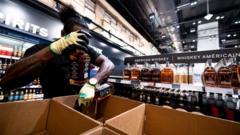In a significant trade backlash, Canadian provinces are removing U.S.-made alcohol from their shelves due to tariffs imposed by the Trump administration. Jack Daniel's parent company, Brown-Forman, labels the response as more harmful than tariffs, despite the relative insignificance of Canada to their overall sales.
Jack Daniel’s Producer Calls Canadian Response to U.S. Tariffs "Disproportionate"

Jack Daniel’s Producer Calls Canadian Response to U.S. Tariffs "Disproportionate"
Brown-Forman's CEO criticizes Canada's decision to remove U.S. alcohol from shelves as retaliation against tariffs, calling it a severe blow to sales.
Canadian provinces, notably Ontario, are enacting measures against U.S. alcoholic beverages as a response to recent tariffs established by the Trump administration on Canadian goods. Lawson Whiting, the CEO of Brown-Forman, which produces the iconic Jack Daniel's whiskey, has characterized the Canadian action as "disproportionate." He pointed out that the move effectively strips U.S. products from store shelves, making it more damaging than the tariffs themselves.
In retaliation to the 25% levies placed on Canadian imports by the U.S., the Ontario Liquor Control Board (LCBO), recognized as one of the largest alcohol buyers globally, has withdrawn all U.S. alcoholic beverages from its inventories. Ontario Premier Doug Ford noted that the LCBO sells nearly $1 billion worth of U.S. alcohol annually, with immediate effects on availability as stated, "As of today, every single one of these products is off the shelves."
While Canadian officials are urging consumers to opt for local alternatives, Whiting acknowledged that Canada accounts for a mere 1% of Brown-Forman's overall sales, shielding the company from severe financial impact. He highlighted an ongoing trend among Canadians who are increasingly turning to domestic products in light of external pressures.
Prime Minister Justin Trudeau joined the conversation, denouncing the U.S. tariffs as "a very dumb thing to do," while insinuating possible adverse consequences for the Canadian economy roaded by President Trump's contentious remarks about annexation. Amid these tensions, Trump has also implicated Canada and Mexico in the flow of fentanyl, a claim both countries dispute.
Whiting expressed cautious optimism as he observes the effects of U.S.-Mexico trade relations, as Mexico represented 7% of Brown-Forman's sales in 2024. With the global market dynamics shifting due to trade disputes, the long-term implications for both Canadian and U.S. businesses remain uncertain.





















